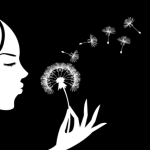
“Logic will take you from A to B. Imagination will take you everywhere.” ~Albert Einstein
I feel grateful to be a writer not only because I love to write, but also because writing has been one of my greatest spiritual teachers. Challenges I face as a writer teach me important life lessons, just as life teaches me lessons I can apply to my writing.
Here are seven spiritual lessons I’ve learned—some the hard way—that can apply to writing and to life in general.
1. Be mindful.
Showing up—really showing up with all your attention—is the first and most important step to writing well. The same might be said of living well—that is, living deeply and fully. Before all else, it’s a matter of showing up and being in the moment.
You can’t expect to write well if you interrupt your writing process to surf the Internet or if your mind wanders to any number of things—usually thoughts that have to do with the past or the future, not the present.
Just as you can’t expect to write well unless you bring your attention to the task at hand—the one sentence you’re writing—you can’t expect to be fully alive if your mind wanders away from the present moment.
When you’re folding laundry, when you’re reading to your child, when you’re walking the dog, when you’re writing a sentence, that should be the only thing that matters.
2. Take things one day at a time.
You can’t write a novel in one day. You put in one day of mindful work, then another, then another, and the result—sometimes years later—might be a novel.
While it’s useful to keep long-term goals in mind, getting too far ahead of yourself can stifle you in the present. I used to keep “to do” lists that included things I wouldn’t need to do for weeks and months, until I realized that I was much more peaceful—and productive—when my “to do” list was limited to just one day—the day I was living.
3. You don’t do this alone.
There are times when I’m writing but it’s not really me, or not only me—something else is with me. The writing comes so effortlessly that I simply can’t take credit for it—certainly not all of it.
I believe that hard work and mindfulness help open the door for something else—call it a muse or a higher power—to become my co-writer.
Life is a creative act—our own work of art that we co-write with the help of something beyond us. By being mindful, by showing up to each moment, by being in-spirit, we invite this powerful life-muse to co-write the stories of our lives.
I believe that this life force is always with us, but there are moments—if we’re mindful enough—that we can become aware of its presence, when we know we’re not alone, and this knowledge is an extra gift.
4. Failure can be our greatest teacher.
I’ve always taken solace from these words from Samuel Beckett: “Ever tried. Ever failed. No matter. Try again. Fail again. Fail better.”
When you write, failure is a given. When you live, failure is a given. The question becomes: What will you do with that failure?
I’ve thrown away too many “failed” short stories and novels to count. These “throw-away” moments are never pleasant, but in each case, sometimes years later, I find myself grateful.
Each “failure” teaches me something important about my writing—what my strengths and weaknesses are and how I might work more towards my strengths.
If we can let go of the myth of perfection and accept that sometimes in life we fail, then we might focus our attention on what “failure” can teach us. The harder the fall, the higher the bounce back up—that is, if we see our falls as opportunities in disguise.
5. Let go of outcome.
When I was younger, I put so much effort into my writing that I couldn’t let go when it came time for my agent to submit my work to editors and publishers. My ego had become attached to the outcome of all that hard work—as if the stories themselves weren’t the outcome!
This is understandable—after all, when we work hard at something, it’s natural to want some kind of “reward.” But when you become attached to outcome, it can take the joy out of the process.
One time I was worrying about whether or not a particular publisher would buy my novel, and a friend of mine—a very wise one—said, “Nick, if it’s meant to be, it will be. You’ve done absolutely everything you can do—you’ve written the book. Now you need to let go.”
I try to remember this each day when any number of things worry me, even small things.
Life presents us with infinite variations of this important distinction—between what we can change and what we can’t, between what is within our control and what isn’t.
6. There’s a difference between envy and holy envy.
Every so often I find myself envying another writer for the level of his or her success—especially if I’m not the biggest fan of the person’s writing. My ego will take over and demand “justice.”
How can so-and-so win such-and-such award and be a bestseller when his writing isn’t really that good. This kind of thinking, which is judgmental, ego-driven, and a little embarrassing, is a sign that I’m not in a good place.
After a few hours (or days) of feeling terrible, I try to remind myself that each person has his or her own path, and that I’m exactly where I need to be. I try to remember that there’s no need to compare. Instead of feeling envy, I try to feel “holy envy.”
Holy envy happens when I read another writer’s work and it’s so good that I can’t possibly feel envy. Instead, I feel gratitude that this writer’s work exists. Rather than feeling competitive, I feel inspired, and my own work gets back on track.
7. We’re here to practice compassion and empathy.
I believe that the most important reason we’re alive is to love—others and ourselves—and that the clearest path to love is through compassion and empathy. Reading and especially writing stories can provide wonderful practice in compassion and empathy.
As a writer, I need to create characters who are flawed—just as we all are—but sympathetic. Trying to empathize with all of my characters, no matter their failures, translates into compassion for the people in my real life—even for strangers, whose life stories I can’t know, but can only imagine.
The more I’m able to feel compassion for others, the more I’m able to feel it for myself.
We can learn most of these life lessons from any creative practice, not just writing.
Painting, dancing, playing a musical instrument—any expression of creativity can provide us with opportunities to be mindful, to take things one day at a time, to invite a co-creator into the process, to learn from “failure,” to practice letting go of outcome, to be inspired by holy envy, and to go beyond ourselves.
Photo by Hughes Michael
About Nicholas Montemarano
Nicholas Montemarano is the author of two novels, "The Book of Why" (2013) and "A Fine Place" (2002), and a short story collection, "If the Sky Falls" (2005). Visit him on Facebook and on Twitter.













 Though I run this site, it is not mine. It's ours. It's not about me. It's about us. Your stories and your wisdom are just as meaningful as mine.
Though I run this site, it is not mine. It's ours. It's not about me. It's about us. Your stories and your wisdom are just as meaningful as mine.